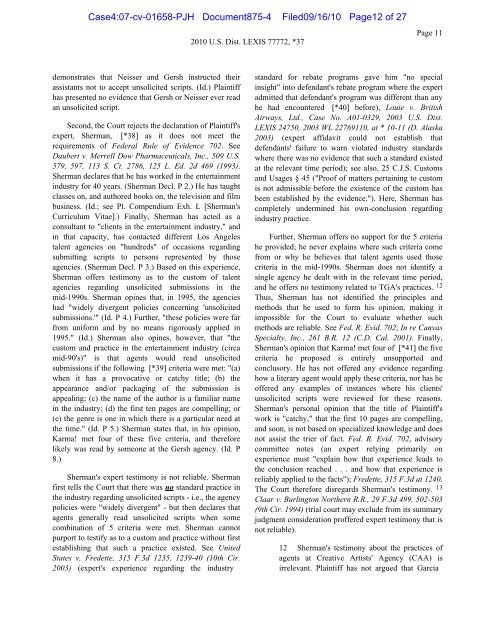exhibit 2 - SAP Lawsuit Portal
exhibit 2 - SAP Lawsuit Portal
exhibit 2 - SAP Lawsuit Portal
Create successful ePaper yourself
Turn your PDF publications into a flip-book with our unique Google optimized e-Paper software.
Case4:07-cv-01658-PJH Document875-4 Filed09/16/10 Page12 of 27<br />
demonstrates that Neisser and Gersh instructed their<br />
assistants not to accept unsolicited scripts. (Id.) Plaintiff<br />
has presented no evidence that Gersh or Neisser ever read<br />
an unsolicited script.<br />
Second, the Court rejects the declaration of Plaintiff's<br />
expert, Sherman, [*38] as it does not meet the<br />
requirements of Federal Rule of Evidence 702. See<br />
Daubert v. Merrell Dow Pharmaceuticals, Inc., 509 U.S.<br />
579, 597, 113 S. Ct. 2786, 125 L. Ed. 2d 469 (1993).<br />
Sherman declares that he has worked in the entertainment<br />
industry for 40 years. (Sherman Decl. P 2.) He has taught<br />
classes on, and authored books on, the television and film<br />
business. (Id.; see Pl. Compendium Exh. L [Sherman's<br />
Curriculum Vitae].) Finally, Sherman has acted as a<br />
consultant to "clients in the entertainment industry," and<br />
in that capacity, has contacted different Los Angeles<br />
talent agencies on "hundreds" of occasions regarding<br />
submitting scripts to persons represented by those<br />
agencies. (Sherman Decl. P 3.) Based on this experience,<br />
Sherman offers testimony as to the custom of talent<br />
agencies regarding unsolicited submissions in the<br />
mid-1990s. Sherman opines that, in 1995, the agencies<br />
had "widely divergent policies concerning 'unsolicited<br />
submissions.'" (Id. P 4.) Further, "these policies were far<br />
from uniform and by no means rigorously applied in<br />
1995." (Id.) Sherman also opines, however, that "the<br />
custom and practice in the entertainment industry (circa<br />
mid-90's)" is that agents would read unsolicited<br />
submissions if the following [*39] criteria were met: "(a)<br />
when it has a provocative or catchy title; (b) the<br />
appearance and/or packaging of the submission is<br />
appealing; (c) the name of the author is a familiar name<br />
in the industry; (d) the first ten pages are compelling; or<br />
(e) the genre is one in which there is a particular need at<br />
the time." (Id. P 5.) Sherman states that, in his opinion,<br />
Karma! met four of these five criteria, and therefore<br />
likely was read by someone at the Gersh agency. (Id. P<br />
8.)<br />
Sherman's expert testimony is not reliable. Sherman<br />
first tells the Court that there was no standard practice in<br />
the industry regarding unsolicited scripts - i.e., the agency<br />
policies were "widely divergent" - but then declares that<br />
agents generally read unsolicited scripts when some<br />
combination of 5 criteria were met. Sherman cannot<br />
purport to testify as to a custom and practice without first<br />
establishing that such a practice existed. See United<br />
States v. Fredette, 315 F.3d 1235, 1239-40 (10th Cir.<br />
2003) (expert's experience regarding the industry<br />
2010 U.S. Dist. LEXIS 77772, *37<br />
Page 11<br />
standard for rebate programs gave him "no special<br />
insight" into defendant's rebate program where the expert<br />
admitted that defendant's program was different than any<br />
he had encountered [*40] before), Louie v. British<br />
Airways, Ltd., Case No. A01-0329, 2003 U.S. Dist.<br />
LEXIS 24750, 2003 WL 22769110, at * 10-11 (D. Alaska<br />
2003) (expert affidavit could not establish that<br />
defendants' failure to warn violated industry standards<br />
where there was no evidence that such a standard existed<br />
at the relevant time period); see also, 25 C.J.S. Customs<br />
and Usages § 45 ("Proof of matters pertaining to custom<br />
is not admissible before the existence of the custom has<br />
been established by the evidence."). Here, Sherman has<br />
completely undermined his own-conclusion regarding<br />
industry practice.<br />
Further, Sherman offers no support for the 5 criteria<br />
he provided; he never explains where such criteria come<br />
from or why he believes that talent agents used those<br />
criteria in the mid-1990s. Sherman does not identify a<br />
single agency he dealt with in the relevant time period,<br />
and he offers no testimony related to TGA's practices. 12<br />
Thus, Sherman has not identified the principles and<br />
methods that he used to form his opinion, making it<br />
impossible for the Court to evaluate whether such<br />
methods are reliable. See Fed. R. Evid. 702; In re Canvas<br />
Specialty, Inc., 261 B.R. 12 (C.D. Cal. 2001). Finally,<br />
Sherman's opinion that Karma! met four of [*41] the five<br />
criteria he proposed is entirely unsupported and<br />
conclusory. He has not offered any evidence regarding<br />
how a literary agent would apply these criteria, nor has he<br />
offered any examples of instances where his clients'<br />
unsolicited scripts were reviewed for these reasons.<br />
Sherman's personal opinion that the title of Plaintiff's<br />
work is "catchy," that the first 10 pages are compelling,<br />
and soon, is not based on specialized knowledge and does<br />
not assist the trier of fact. Fed. R. Evid. 702, advisory<br />
committee notes (an expert relying primarily on<br />
experience must "explain how that experience leads to<br />
the conclusion reached . . . and how that experience is<br />
reliably applied to the facts"); Fredette, 315 F.3d at 1240.<br />
The Court therefore disregards Sherman's testimony. 13<br />
Claar v. Burlington Northern R.R., 29 F.3d 499, 502-503<br />
(9th Cir. 1994) (trial court may exclude from its summary<br />
judgment consideration proffered expert testimony that is<br />
not reliable).<br />
12 Sherman's testimony about the practices of<br />
agents at Creative Artists' Agency (CAA) is<br />
irrelevant. Plaintiff has not argued that Garcia


